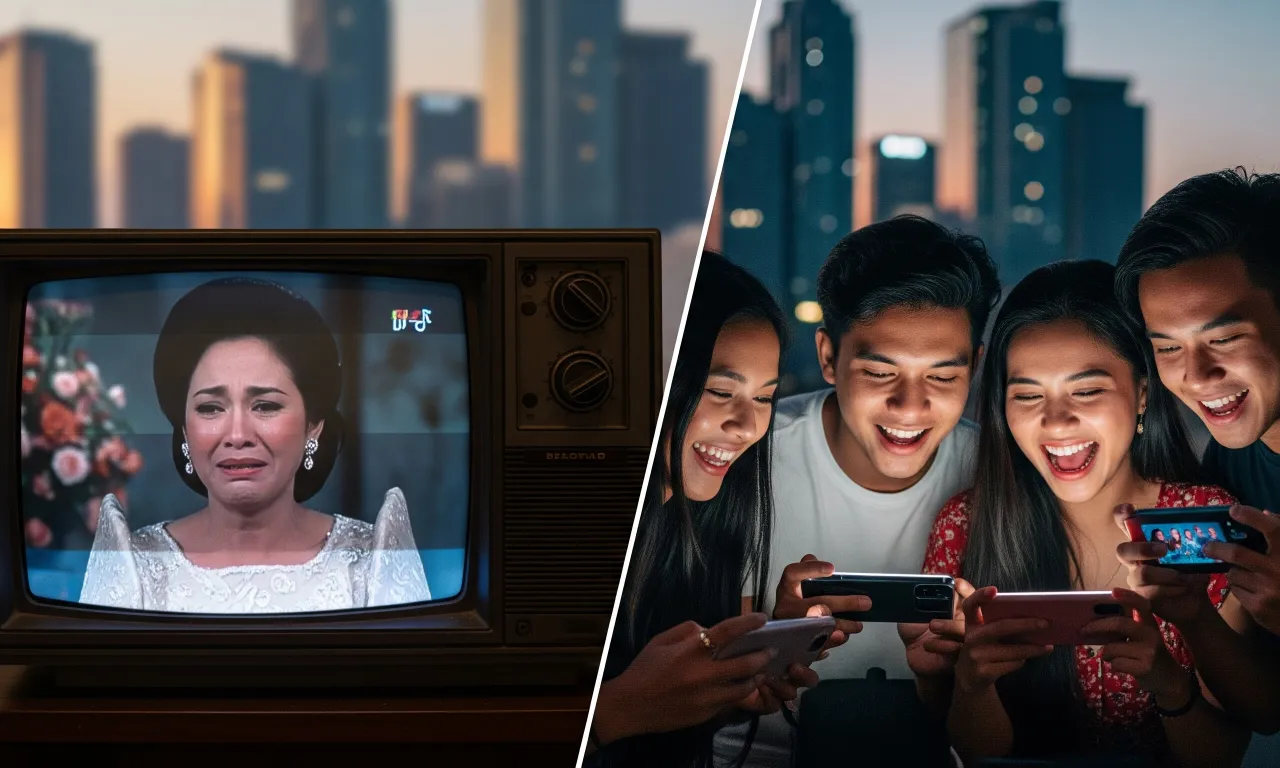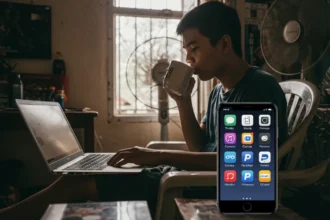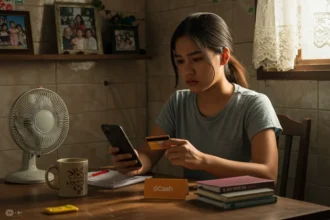There was a time when showbiz ruled everything – TV dramas, Sunday variety shows, and primetime love teams. But that was before the algorithm. Now? Gen Z runs the spotlight.
- 📱 From TV Screens to Phone Screens: The Rise of Digital Entertainment in the Philippines
- 🎤 Meet the New Stars: Filipino Creators Redefining Fame and Influence
- 💡 How Gen Z Changed the Rules of Fame (and What Old Media Can Learn)
- 🌐 The Future of Filipino Entertainment: Where Gen Z Goes Next
- 💬 FAQs About Gen Z and Philippine Entertainment
- The Spotlight Belongs to Everyone
- 🧭 References
They don’t wait for network auditions or studio contracts. They pick up a phone, hit record, and boom – instant content, instant audience, instant fame. From TikTok comedians and indie vloggers to bedroom musicians and digital storytellers, this generation has completely changed how Filipinos create, share, and consume entertainment.
And it’s not just about clout. Gen Z creators built communities – online barkadas that vibe over humor, heartbreak, and “relatable” chaos. They made authenticity the new standard, turning social media into both stage and diary.
The result? Philippine entertainment isn’t just evolving – it’s exploding online. The next big star might not be discovered by a network scout anymore… but by your For You Page.
📱 From TV Screens to Phone Screens: The Rise of Digital Entertainment in the Philippines
Remember when life revolved around the TV schedule?
When Sunday meant ASAP, and primetime was sacred – teleseryes at 7 PM, news at 9, then comedy reruns before bed. Everyone had a favorite love team, and the biggest dream was to see your idol on Eat Bulaga or Star Magic.
Those days built the backbone of Philippine entertainment – and honestly, they were magical. Families gathered around one screen, sharing laughter, gasps, and “hala siya oh!” reactions together. It was personal, collective, and purely Pinoy.
But somewhere along the way… the screen shrank.
Now, our “primetime” lives in our palms – not in living rooms. We don’t wait for network slots or press releases anymore. We get updates straight from TikTok, see drama unfold on X (formerly Twitter), and catch behind-the-scenes vlogs before the episode even airs. The audience doesn’t just watch now – they participate.
📲 Social media turned spectators into storytellers.
Instead of movie premieres, we now have livestreams and soft launches. Instead of talent scouts, we have algorithms. Someone from Tarlac can drop a random dance challenge at 2 a.m. and wake up trending nationwide. That’s how fast fame moves now.
YouTube gave rise to the first wave – vloggers like Cong TV, Mimiyuuuh, and Alex Gonzaga changed how we define “celebrity.” Then TikTok came in and rewrote the rules completely – everyday Pinoys became entertainers overnight. Comedy, heartbreak, spoken word, song covers, slice-of-life content – lahat pwede.
And it’s not just about views.
It’s about voice.
Digital entertainment democratized fame. It gave power to those who never had access to mainstream media. It opened doors for LGBTQ+ creators, small-town talents, and even shy introverts who just needed one viral clip to be seen.
The shift is clear – from polished to personal, from broadcast to connection.
The TV once made us dream of stars.
Now, social media reminds us: we can be one, too. 🌟
🎤 Meet the New Stars: Filipino Creators Redefining Fame and Influence
Gone are the days when you needed a studio contract to become a star. Today, fame starts with Wi-Fi and confidence. And Gen Z? They’ve mastered both.
From bedroom setups to viral stages, young Filipino creators have turned platforms into playgrounds. Esnyr Ranollo built a career from school-themed skits that felt too real (lahat tayo may kaklaseng ganun 😅). Niana Guerrero turned dance into global domination – pure talent, no network backing. Zack Tabudlo, once a YouTube cover artist, now fills arenas with songs born online. Even gamers like ChooxTV and streamers like Alodia Gosiengfiao proved that “entertainment” isn’t limited to showbiz – it’s wherever people connect and feel seen.
But what really sets Gen Z apart is their authenticity. They don’t hide the mess behind the magic. You’ll see them laugh, cry, rant, and overshare – and that’s exactly why people trust them. They blur the line between celebrity and barkada. One moment they’re joking about heartbreak, the next they’re leading donation drives or advocating mental health.
Their fame isn’t built on mystery – it’s built on relatability.
Their audience doesn’t just watch them – they grow up with them.
In a country that once worshiped perfection, Gen Z flipped the script: real beats flawless, and connection beats production value.
And maybe that’s the most refreshing thing about it – we’re not just witnessing a new wave of entertainment… we’re witnessing a new kind of honesty.
💡 How Gen Z Changed the Rules of Fame (and What Old Media Can Learn)
In the old days, fame was a one-way street. Stars performed, fans applauded, and the distance between them was sacred. But Gen Z? They built a two-way expressway – open comments, DMs, duets, stitches, and “pa-collab pls po.”
The walls of traditional showbiz crumbled the moment creators realized they didn’t need permission to be seen. What networks once guarded, the internet made accessible. A 16-year-old with a cracked phone camera now has more reach than a primetime actor. And unlike the carefully curated world of celebrities, Gen Z thrives on realness.
They post bloopers, rants, even breakdowns – and people love them more for it. Because they don’t just entertain; they relate. They make you feel like, “Uy, ako din ‘yan.” It’s emotional honesty turned into content currency.
And here’s what traditional media missed: community.
Gen Z doesn’t chase followers – they build fandoms that feel like families. A vlogger’s comment section can be more comforting than a Sunday sitcom. Their viewers defend them, donate to them, and even join their causes. That level of connection isn’t accidental – it’s designed by empathy and interaction.
📲 Engagement is the new ratings.
Instead of counting views alone, Gen Z measures success through reactions, duets, and stories reshared a thousand times. Their storytelling style is quick, unfiltered, and inclusive – they break the fourth wall because they never built one to begin with.
Even brands are catching up. Gone are the glossy ads with scripted smiles. Now it’s “Hey guys, I tried this!” and a shaky handheld clip filmed in someone’s bedroom – yet it sells more because it feels real.
Traditional networks are slowly learning: the new entertainment isn’t about stage lights – it’s about spotlights shared by millions.
Because Gen Z didn’t just join the industry… they rewired it. They turned platforms into playgrounds, audiences into collaborators, and fame into a conversation.
And honestly? That’s the kind of revolution only a Filipino could make – loud, funny, emotional, and so, so real.
🌐 The Future of Filipino Entertainment: Where Gen Z Goes Next
If there’s one thing we’ve learned, it’s this – Gen Z doesn’t wait for permission. They build, they remix, they go viral overnight. And the best part? They’re bringing Filipino creativity to the world stage in ways no studio ever could.
From P-pop fandoms flooding Twitter trends to indie TikTok storytellers filming cinematic shorts on their phones, Filipino youth are proving that we’re not just consumers of global content – we’re creators of it. They mix English and Tagalog effortlessly, drop hugot lines in reaction videos, and make humor that only another Pinoy would get. The result? A digital culture that’s proudly local yet instantly relatable everywhere.
And it’s not slowing down.
We’re seeing Gen Zs collaborating across borders – Manila collabs with Jakarta, Cebu artists working with Seoul producers, Visayan streamers gaming with audiences from California. Filipino voices are louder, funnier, and more honest than ever before.
Old entertainment systems were built on exclusivity – gates, auditions, and executives deciding who “makes it.” The new system? Built on connectivity. The internet doesn’t care about who you know – it cares about what you create.
Gen Z made it okay to fail publicly, start over, and keep posting anyway. They taught us that virality isn’t luck – it’s consistency, creativity, and courage. The next decade of Philippine entertainment will be run by creators who are equal parts artist, entrepreneur, and storyteller.
And honestly? That’s exciting. Because when Filipinos create, we don’t just follow trends – we give them heart. 💙
So maybe the future of entertainment isn’t about the biggest network anymore. Maybe it’s about the biggest connection.
And in that world, Gen Z already won.
💬 FAQs About Gen Z and Philippine Entertainment
1. How is Gen Z changing Philippine entertainment?
Gen Z flipped the script – from TV studios to TikTok screens. They don’t wait for auditions or producers; they build their own stage online. By creating authentic, relatable content, they made entertainment accessible to anyone with Wi-Fi and a story to tell. Their mix of humor, creativity, and emotion now drives what Filipinos watch every day.
2. Why do Filipinos connect so much with Gen Z creators?
Because they feel real. Gen Z creators show both the highlights and the messy parts of life, making followers feel like barkada, not fans. They speak our language – Taglish, memes, hugot, everything. That honesty breaks barriers and builds genuine connection, something traditional celebrities often lacked.
3. What social media platforms dominate Philippine entertainment today?
TikTok and YouTube lead the pack, followed by Facebook Reels and Instagram. TikTok is where trends are born – dances, humor, even activism. YouTube still rules long-form storytelling and vlogs. Meanwhile, X (Twitter) and Facebook remain the go-to spots for discussions, updates, and marites moments.
4. How do Gen Z creators earn from their content?
Aside from ad revenue, they earn through brand partnerships, affiliate marketing, livestream gifts, and merch sales. Some diversify with Patreon, Spotify podcasts, or online courses. What’s cool is how creative they get – turning viral moments into business ideas. Many now treat content creation as a full-time career, not just a hobby.
5. Are Gen Z influencers replacing traditional celebrities?
Not exactly – they’re coexisting. Traditional celebs still dominate TV and film, but influencers rule attention online. More and more, brands and networks are blending both worlds – pairing stars with creators for reach and authenticity. In short, it’s no longer either-or; it’s collab na lang!
6. What lessons can old media learn from Gen Z?
Old media can learn to listen more and script less. Gen Z’s success lies in interaction – comments, duets, live replies. People now crave transparency and relatability, not perfection. Traditional networks that adapt this mindset will stay relevant in a culture that values connection over production.
7. How do Filipino Gen Z creators influence culture and trends?
They dictate slang, music, fashion, and even social awareness. A TikTok sound can become a national inside joke overnight. They turn daily struggles into comedy and social issues into conversations. Their influence shapes how Filipinos talk, dress, and express themselves online – pure cultural energy.
8. Is content creation a stable career for young Filipinos?
It can be, but only with strategy and discipline. Virality fades fast; sustainability comes from consistency and community. Many Gen Z creators now treat their platforms like small businesses – scheduling uploads, managing teams, and diversifying income. The passion is real, but so is the pressure to keep growing.
9. How is technology shaping the future of entertainment in the Philippines?
Technology is breaking borders. Faster internet, better cameras, and AI tools allow Filipinos to produce global-quality content from home. Platforms give analytics that help creators know what resonates. The more tech evolves, the more creative freedom Filipinos gain – no gatekeepers, just pure innovation.
10. What makes Filipino Gen Z entertainment unique from other countries?
Heart. Every skit, vlog, or song carries that signature Pinoy emotion – humor mixed with empathy. Filipinos can turn ordinary moments into stories that hit deep, even for international audiences. Our blend of warmth, wit, and resilience makes local content stand out globally. We don’t just entertain – we connect.
The Spotlight Belongs to Everyone
Gen Z didn’t just change Philippine entertainment – they democratized it. What used to belong to a few TV networks now lives in every phone, every vlog, every viral sound that makes us laugh at 2 AM. They blurred the line between celebrity and audience, between performer and friend.
And maybe that’s the most beautiful part – we’re all part of the show now. Every like, every share, every “HAHA same!” comment is a tiny piece of modern Filipino storytelling. It’s messy, emotional, and unpredictable – just like us.
This generation reminds us that real fame isn’t measured in ratings or billboards anymore. It’s measured in connection.
And for as long as Filipinos keep creating, sharing, and dreaming online – the spotlight will never fade.
🧭 References
-
Tribune PH – Gen Z Fandom Culture Online
-
Woman PH – Reality TV in the Social Media Era
-
PurpleBug – How Each Generation Consumes Digital Content
-
BW Online – Generation Alpha to Make Up 27% of PH by 2030
-
Sunday PH – From Viral to Valuable: Industry Trends 2025










